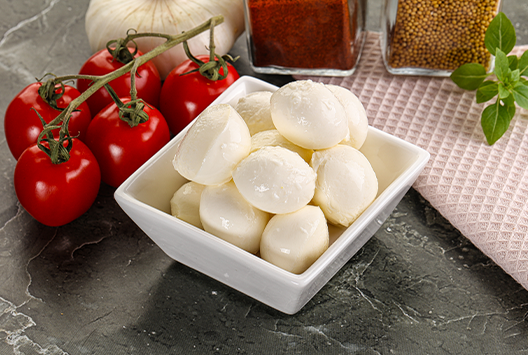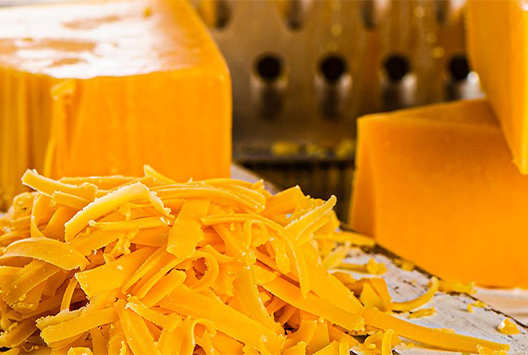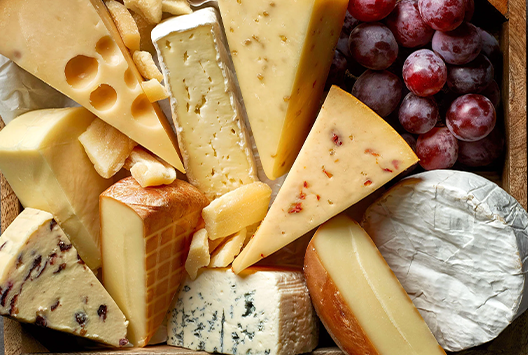
Is Mozzarella Cheese Healthy? We’ve Got Your Answer
Similar
Mozzarella cheese is a type of cheese that is popular in Italian cuisine. It is made from cow's milk and is one of the most popular cheeses used in pizza, lasagna, and other Italian dishes. Many people are curious if mozzarella cheese is a healthy food choice, and the answer is that it can be! Let's learn more about this:
It's a good source of protein
Mozzarella is a great source of protein, providing 8 grams per one-ounce serving. This makes it a great choice for people looking to increase their protein intake. Protein plays an important role in building and maintaining muscle, and it's also essential for healthy skin, bones, and organs. Eating mozzarella can help you meet your protein needs without having to rely on other animal proteins such as beef or chicken.
It's a good source of many essential minerals
Mozzarella is rich in essential minerals like calcium, magnesium, and phosphorus. Calcium, crucial for strong teeth and bones, prevents decay and gum disease. Selenium in mozzarella protects cells, reduces inflammation, and supports the immune system, benefiting cognitive function. Additionally, the cheese boasts high Vitamin A content, promoting healthy eyes, skin, teeth, and gums, while aiding in new bone cell growth.
It has less sodium than most other cheeses
One of the most significant benefits of mozzarella cheese is that it has less sodium than most other cheeses. Sodium is an important mineral that helps regulate blood pressure, as well as fluid balance in the body. When consumed in excess, it can lead to a number of health problems, including hypertension and stroke. By choosing a low-sodium cheese like mozzarella, you can rest assured that you won’t be overloading your body with sodium.
It's lower in saturated fat
Saturated fats are types of fats that can raise cholesterol levels in the body and increase the risk of heart disease. However, mozzarella has a significantly lower amount of saturated fat than other cheeses. A single serving of regular mozzarella cheese (about 1.5 ounces) contains just 3.5 grams of saturated fat, compared to 7.5 grams in a serving of cheddar cheese. This makes mozzarella an excellent choice for those who need to watch their saturated fat intake.
How much mozzarella should you eat in a day?
If you’re looking to add some extra flavor and nutrition to your diet, mozzarella cheese is a great choice. But how much mozzarella should you eat each day?
The answer really depends on your individual health needs and goals. For most healthy adults, the recommended daily intake of cheese is around 1.5 ounces. This amount provides a good balance between the health benefits of cheese and the potential risks associated with too much cheese.
When it comes to mozzarella cheese specifically, 1.5 ounces is a good guideline. This amount provides around 100 calories, 7 grams of protein, and 6 grams of fat. It’s also a great source of calcium, phosphorus, and vitamin B12.
If you’re looking for a little extra flavor and nutrition, you could add a few slices of mozzarella to your salads, sandwiches, or pizzas. You could also use mozzarella cheese to make delicious homemade pizzas, calzones, and even grilled cheese sandwiches.
For those who are trying to lose weight, it’s important to keep in mind that cheese can be high in calories and fat. So if you’re trying to cut back on calories, you may want to limit your portion sizes.
Say mozzarella!
Mozzarella cheese can be considered a healthy food option when eaten in moderation. It is a good source of protein, calcium, and phosphorus, and is lower in fat and sodium than many other cheese varieties. That said, it is important to remember that consuming too much of any food, even one as healthy as mozzarella, can lead to weight gain and other health issues. It's also vital that you get your mozzarella cheese from a trusted dairy and beverage company like Baladna.
Baladna cheese, including mozzarella, is fresh and high quality. Baladna is among the biggest cattle farms with about 24000 cows that are kept in a well-conditioned environment to ensure only the best dairy products. Try Baladna mozzarella cheese and other products today!



